人教版高中英语必修一知识点总结
人教版高中英语必修一 重点短语、语法知识点总结
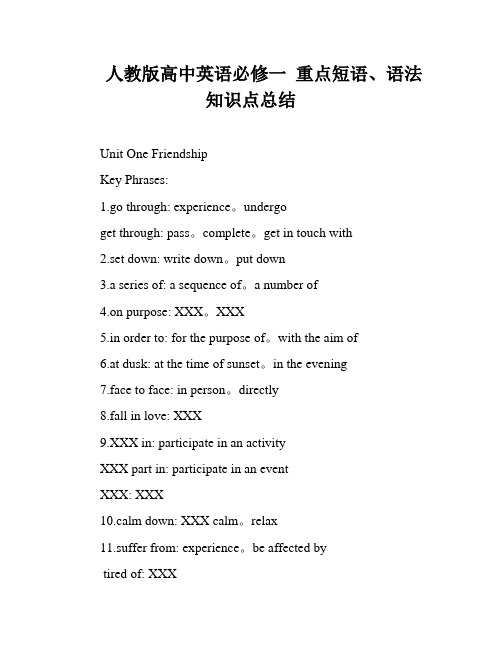
人教版高中英语必修一重点短语、语法知识点总结Unit One FriendshipKey Phrases:1.go through: experience。
undergoget through: pass。
complete。
get in touch with2.set down: write down。
put down3.a series of: a sequence of。
a number of4.on purpose: XXX。
XXX5.in order to: for the purpose of。
with the aim of6.at dusk: at the time of sunset。
in the evening7.face to face: in person。
directly8.fall in love: XXX9.XXX in: participate in an activityXXX part in: participate in an eventXXX: XXX10.calm down: XXX calm。
relax11.suffer from: experience。
be affected bytired of: XXX13.be concerned about: care about。
worry about14.get on/along well with: have a good nship with15.be good at/do well in: be skilled at。
excel in16.find it + adj。
to do sth.: consider doing something to be。
17.XXX: not anymore18.too much: an excessive amount (used with uncountable nouns)much too: excessively (used with adjectives)19.not…until: only after。
人教版高一英语必背知识点总结梳理5篇

人教版高一英语必背知识点总结梳理5篇高中阶段学习难度、强度、容量加大,学习负担及压力明显加重,不能再依赖初中时期老师“填鸭式”的授课,“看管式”的自习,“命令式”的作业,要逐步培养自己主动获取知识、巩固知识的能力,制定学习计划,养成自主学习的好习惯。
下面就是小编给大家带来的人教版高一英语知识点总结,希望能帮助到大家!人教版高一英语知识点总结1一、一般过去将来时1.概念:立足于过去某一时刻,从过去看将来,常用于宾语从句中。
2.时间状语:The next day (morning, year…),the following month(week…),etc.3.基本结构:主语+was/were +going to + do+其它;主语+would/should + do+其它4.否定形式:主语+was/were+not + going to + do; 主语+would/should + not + do.5.一般疑问句:was或were放于句首;would/should 提到句首。
6.例句:He said he would go to Beijing the next day.他说他第二天要去北京。
I asked who was going there.我问,谁要去那里。
二、现在进行时1.概念:表示现阶段或说话时正在进行的动作及行为。
2.时间状语:Now, at this time, days, etc. look. listen3.基本结构:主语+be +doing +其它4.否定形式:主语+be +not +doing+其它5.一般疑问句:把be动词放于句首。
6.例句:How are you feeling today?你今天感觉如何?He is doing well in his lessons.在课上他表现得很好。
人教版高一英语知识点总结2as 可作关系代词,引导定语从句。
1.asas可以在限制性定语从句和非限制性定语从句中作主语或宾语。
新人教版高一英语必修一知识点复习整理

新人教版高一英语必修一知识点复习整理1. 语法知识点
- 介词的用法
- 表示时间、地点和方式等
- 注意介词和动词的搭配
- 冠词的用法
- 不定冠词a和an的用法
- 定冠词the的用法
- 名词的单复数形式
- 一般名词的复数形式
- 不规则名词的复数形式
2. 词汇知识点
- 常用动词短语
- 与各种情境相关的常用动词短语
- 包括表示喜欢、讨厌、担心、希望等意思的动词短语
- 常用形容词及副词
- 描述人、事物特征的常用形容词
- 表示时间、程度、方式等的常用副词- 高频词汇
- 重点掌握高频出现的单词和常用短语3. 阅读技巧
- 预测文意
- 根据上下文预测单词或句子的意思
- 联系上下文理解文章
- 通过上下文的线索来理解全文意思
- 抓住文中关键信息
- 注意文章中的重点句子,理解文章主旨4. 写作技巧
- 语法正确性
- 注意动词时态和主谓一致
- 尽量避免语法错误
- 结构完整性
- 确保文章有开头、主体和结尾
- 逻辑连贯性
- 使用适当的连接词
- 使用连接词使句子和句子之间衔接紧密
以上是《新人教版高一英语必修一》的知识点复习整理,希望对你的学习有所帮助。
人教版_高中英语_必修一_知识点总结

人教版必修一各单元知识点总结Unit One Friendship一、重点短语1.go through 经历,经受get through 通过;完成;接通电话2. set down 记下,放下3. a series of 一系列4. on purpose 有目的的5. in order to 为了6. at dusk 傍晚,黄昏时刻7. face to face 面对面8. fall in love 爱上9. join in 参加(某个活动);take part in 参加(活动)join 加入(组织,团队,并成为其中一员)10. calm down 冷静下来11. suffer from 遭受12. be/get tired of…对…感到厌倦13. be concerned about 关心14. get on/along well with 与…相处融洽15. be good at/do well in 擅长于…16. find it + adj. to do sth. 发现做某事是…17. no longer / not …any longer 不再…18. too much 太多(后接不可数n.)much too 太…(后接adj.)19. not…until 直到…才20. it’s no pleasure doing sth 做…并不开心21. make sb. sth. 使某人成为…make sb. do sth. 使某人做某事二、语法----直接引语和间接引语概念:直接引语:直接引述别人的原话。
一般前后要加引号。
间接引语:用自己的话转述别人的话。
间接引语在多数情况下可构成宾语从句且不要加引号。
例:Mr. Black said, “ I’m busy.”Mr. Black said that he was busy.变化规则(一)陈述句的变化规则直接引语如果是陈述句,变为间接引语时,用连词that(可省略)引导,从句中的人称、时态、指示代词、时间状语、地点状语都要发生相应的变化。
新教材 人教版高中英语必修第一册全册各单元知识点提炼汇总(单词短语语法写作等)
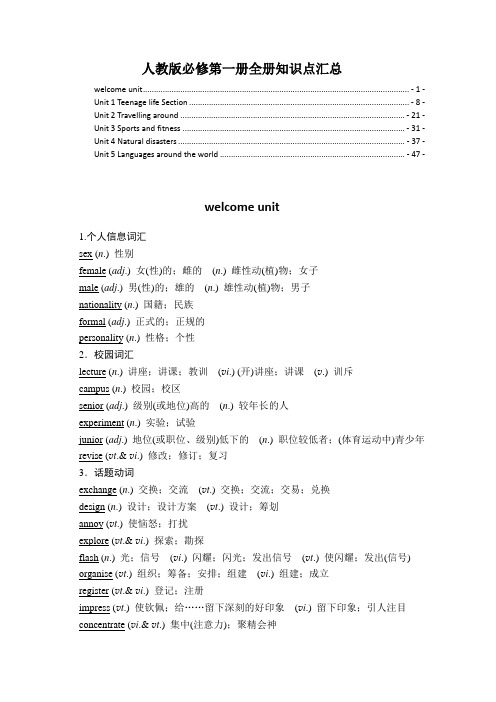
人教版必修第一册全册知识点汇总welcome unit ......................................................................................................................... - 1 - Unit 1 Teenage life Section .................................................................................................... - 8 - Unit 2 Travelling around ...................................................................................................... - 21 - Unit 3 Sports and fitness ..................................................................................................... - 31 - Unit 4 Natural disasters ....................................................................................................... - 37 - Unit 5 Languages around the world .................................................................................... - 47 -welcome unit1.个人信息词汇sex (n.) 性别female (adj.) 女(性)的;雌的(n.) 雌性动(植)物;女子male (adj.) 男(性)的;雄的(n.) 雄性动(植)物;男子nationality (n.) 国籍;民族formal (adj.) 正式的;正规的personality (n.) 性格;个性2.校园词汇lecture (n.) 讲座;讲课;教训(v i.) (开)讲座;讲课(v.) 训斥campus (n.) 校园;校区senior (adj.) 级别(或地位)高的(n.) 较年长的人experiment (n.) 实验;试验junior (adj.) 地位(或职位、级别)低下的(n.) 职位较低者;(体育运动中)青少年revise (v t.& v i.) 修改;修订;复习3.话题动词exchange (n.) 交换;交流(v t.) 交换;交流;交易;兑换design (n.) 设计;设计方案(v t.) 设计;筹划annoy (v t.) 使恼怒;打扰explore (v t.& v i.) 探索;勘探flash (n.) 光;信号(v i.) 闪耀;闪光;发出信号(v t.) 使闪耀;发出(信号) organise (v t.) 组织;筹备;安排;组建(v i.) 组建;成立register (v t.& v i.) 登记;注册impress (v t.) 使钦佩;给……留下深刻的好印象(v i.) 留下印象;引人注目concentrate (v i.& v t.) 集中(注意力);聚精会神improve (v i.& v t.) 改进;改善4.话题描述性词汇anxious (adj.) 焦虑的;不安的annoyed (adj.) 恼怒的;生气的frightened (adj.) 惊吓的;害怕的outgoing (adj.) 爱交际的;外向的awkward (adj.) 令人尴尬的;难对付的confident (adj.) 自信的;有把握的curious (adj.) 好奇的;求知欲强的forward (ad v.) (also forwards) 向前;前进(adj.) 向前的;前进的5.话题名词registration (n.) 登记;注册;挂号nation (n.) 国家;民族;国民designer (n.) 设计者impression (n.) 印象;感想confidence (n.) 信心;信任guy (n.) 小伙子;男人;家伙organisation (n.) 组织;团体;机构goal (n.) 目标;球门;射门strategy (n.) 策略;策划partner (n.) 同伴;配偶;合伙人company (n.) 公司;商行;陪伴style (n.) 方式;作风6.话题短语senior_high_school 〈美〉高中at_last 终于;最终make_an_impression 留下好印象what_if 要是……会怎么样呢concentrate_on 集中精力于leave ... alone 不打扰;不惊动junior_high_school 〈美〉初级中学look_forward_to 盼望,期待take_notes 记笔记flash_card 教学卡片;识字卡重点知识合作探究Our school invited two engineers to design_a_language_lab_for_us.我们学校邀请了两位工程师为我们设计一个语言实验室。
人教版高一英语必修一知识点总结

人教版高一英语必修一知识点总结人教版高一英语必修一知识点总结(一)1.preferPrefer doing …to doing…Prefer to do rather than do2.advantages /disadvantages 优势/劣势2.Ever since middle school, my sister Wang Wei and I have dreamed about taking a great bike trip. 从高中起,我姐姐王维和我就一直梦想做一次伟大的自行车旅行。
连词since 引导的时间状语从句用一般过去时,介词since 与时间点连用It is/has been+一段时间+since+一般过去时自从……至今已经多久了。
3. persuade sb to do sth= persuade sb into doing sth 说服某人做某事4. 强调句型 It is/was+被强调部分+that/who强调句型可以强调除谓语动词以外的任何句子成份。
一般来说,如果被强调部分是人时,用连词that或who;如果被强调部分是物,只能用连词that。
not … until 的强调句5.be fond of 喜欢,喜爱6. Although 尽管,虽然,引导让步状语从句① although 从句多在句首, though 从句可在主句前、中、后任何位置,而且though 可以作副词用于句末,作“但是,不过”讲,而although 无此用法。
② as though(仿佛,好像),even though(即使,尽管)中不能用although。
③ though 引导的让步状语从句可以倒装(将表语、状语、情态动词后的动词原形前置到句首,此用法同as),而 although 不可以。
7. insist on doing sth/ sth. 一定要、坚持主张She insists on getting up early and playing her radio loudly.她老是一大早起来把收音机音量开大11.care about 关心在乎care for 喜欢,照料,照顾12.change ones mind 改变主意13. experience 经历/经验14. Once 可作为从属连词,作“一(旦)……就……”解,连接一个表示时间的状语从句。
人教版高中英语必修1知识点汇总(一册全)
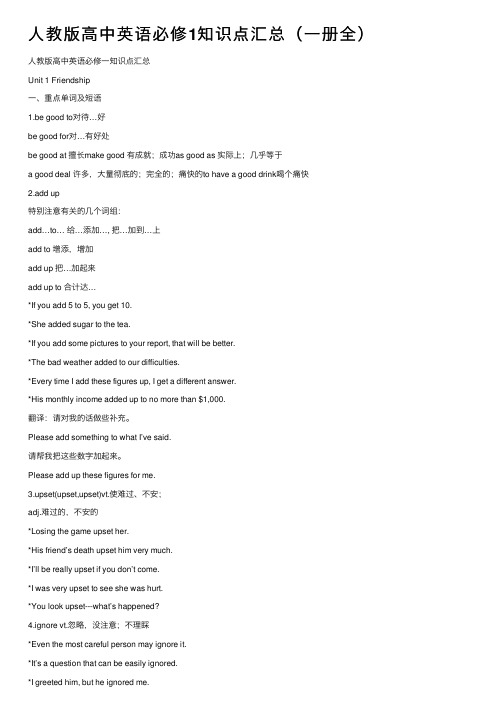
⼈教版⾼中英语必修1知识点汇总(⼀册全)⼈教版⾼中英语必修⼀知识点汇总Unit 1 Friendship⼀、重点单词及短语1.be good to对待…好be good for对…有好处be good at 擅长make good 有成就;成功as good as 实际上;⼏乎等于a good deal 许多,⼤量彻底的;完全的;痛快的to have a good drink喝个痛快2.add up特别注意有关的⼏个词组:add…to… 给…添加…, 把…加到…上add to 增添,增加add up 把…加起来add up to 合计达…*If you add 5 to 5, you get 10.*She added sugar to the tea.*If you add some pictures to your report, that will be better.*The bad weather added to our difficulties.*Every time I add these figures up, I get a different answer.*His monthly income added up to no more than $1,000.翻译:请对我的话做些补充。
Please add something to what I’ve said.请帮我把这些数字加起来。
Please add up these figures for me.3.upset(upset,upset)vt.使难过、不安;adj.难过的,不安的*Losing the game upset her.*His friend’s death upset him very much.*I’ll be really upset if you don’t come.*I was very upset to see she was hurt.*You look upset---what’s happened?4.ignore vt.忽略,没注意;不理睬*Even the most careful person may ignore it.*It’s a question that can be easily ignored.*I greeted him, but he ignored me.5.calm adj.平静的,镇静的;风平浪静的vt.使平静*After the storm, the sea was calm again.*Keep calm in time of danger.*Don’t be nervous; calm yourself, please.calm down平静下来*I told him to calm down.6.concern vt.关系到,和…有关;使关⼼*This matter concerns all of us.*I’m not concerned with this matter again.be concerned about关⼼…;为…担⼼*Please don’t be concerned about me.7.go through 经历,经受;审阅,检查*Most families went through a lot during the war. *I can’t go through these letters in an hour.8. “make her diary her best friend”“call my friend Kitty”make和call都能以名词作宾语补⾜语,即make+sb./sth.+n. 使某⼈/某物成为…call+sb./sth.+n. 称某⼈/某物为…*We must try to make our country a strong one.*All work and no play makes Jack a dull boy.*We called messenger msn in short.*What do you call it?9.everything to do with naturesomething/anything/everything/nothing to do with 与…有关/⽆关*What he is doing has nothing to do with his work.10.far too much实在太多too much(+n.)太多(…), 超过某⼈的能⼒far/much too+adj./adv.实在太…too much homeworkThe work is too much for a boy like him.It’s (much/far) too hot todaymuch/ far too much实在太多11.suffer vi.受苦,受痛苦,受损失vt.受到,遭受*He suffered terribly when his mother died.*He looked pale, and seemed to have suffered a lot/a great deal. *We suffered a set-back/no pain. suffer from遭受,患(病)*I suffered much from lack of rest.suffer from cold/cancer12.recover vt.恢复vi.痊愈*She recovered her health.*Amy is recovering from a severe illness.*He is unlikely to recover.13.get tired of对…开始感到厌烦(表动作)be tired of对…感到厌烦(表状态)14.get along with和…相处;进展*They get along quite well with each other.*How are you getting along with your classmates?*How are you getting along with your English?*I’m getting along well with my study.15.exactly adv.确切地;正是;说的对*You must tell me exactly what you’re doing?*That’s exactly what I want.*It looks exactly like an elephant’s leg.*Exactly!(=That’s right.)16.grateful adj.感激的*I’m very grateful to you for your advice.=Thank you very much for your advice.17.joinA.参加,加⼊(成为其中的成员)*He joined the army/the Party 3 years ago.*He is too young to join the club.B.join sb.和某⼈⼀起(从事某活动)*Will you join us for dinner?*I’ll join you later.*May I join you in the game?C.join in参加某活动(=take part in)*A lot of newcomers joined in the discussion.*May I join in the game?⼆、重点句型1. Do you want a friend whom you could tell everything to, like your deepest feelings and thoughts?2. I wonder if it’s because I haven’t been able to be outdoors for so long that I’ve grown so crazy about everything to do with nature.3. I can well remember that there was a time when a deep blue sky, the song of the birds, moonlight and flowers could never have kept me spellbound.4. It’s no pleasure looking through these any longer because nature is one thing that really must be experienced.5. It/This/That is the first /second…time that+现在完成时“某⼈第⼀/⼆次做……”eg. It is the first time that I have been to the airport.It/This/That was the first / second…timethat+过去完成时eg. It was the second time that I had seen him.三、语法语法----直接引语和间接引语概念:直接引语:直接引述别⼈的原话。
人教版高一英语必修一知识点总结五篇
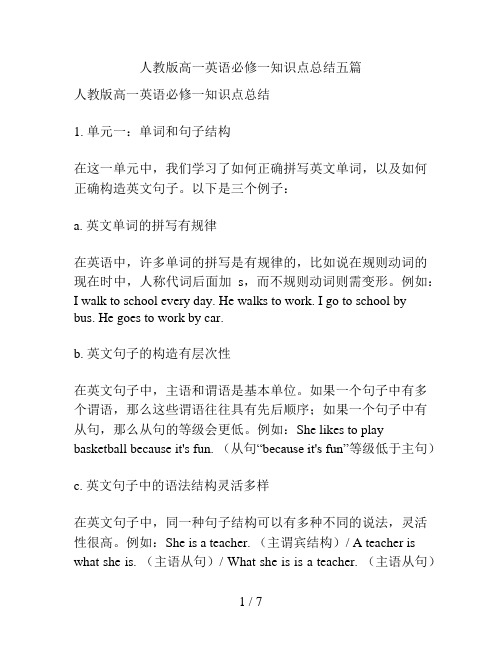
人教版高一英语必修一知识点总结五篇人教版高一英语必修一知识点总结1. 单元一:单词和句子结构在这一单元中,我们学习了如何正确拼写英文单词,以及如何正确构造英文句子。
以下是三个例子:a. 英文单词的拼写有规律在英语中,许多单词的拼写是有规律的,比如说在规则动词的现在时中,人称代词后面加s,而不规则动词则需变形。
例如:I walk to school every day. He walks to work. I go to school by bus. He goes to work by car.b. 英文句子的构造有层次性在英文句子中,主语和谓语是基本单位。
如果一个句子中有多个谓语,那么这些谓语往往具有先后顺序;如果一个句子中有从句,那么从句的等级会更低。
例如:She likes to play basketball because it's fun. (从句“because it's fun”等级低于主句)c. 英文句子中的语法结构灵活多样在英文句子中,同一种句子结构可以有多种不同的说法,灵活性很高。
例如:She is a teacher. (主谓宾结构)/ A teacher is what she is. (主语从句)/ What she is is a teacher. (主语从句)2. 单元二:课文阅读在这一单元中,我们学习了如何正确理解英文课文的内容,并提高了对英文阅读的兴趣和能力。
以下是三个例子:a. 英文课文中的语言运用丰富多样英文课文中的语言运用很丰富,包括比喻、暗示、转喻等等,需要我们认真阅读并理解。
例如:The sky was a bright shade of blue. (比喻)/ Her words cut him like a knife. (转喻)b. 英文课文中的句式多种多样英文课文中的句式也很多样,有短句和长句、简单句和复合句等等。
我们需要慢慢地理解它们,并掌握如何从中获取信息。
高中英语(新人教版)必修一知识点归纳

高中英语必修一知识点归纳Welcome Unit知识点归纳Part one Vocabulary1. exchange n.交换;交流vt.交换;交流;交易;兑换In exchange (for...)作为(与......的)交换exchange student 交换生exchange A for B 以A交换B:把A兑换成B exchange sth. with sb. 与某人交流/交换某物exchange opinions/ideas/views交流意见/想法/看法2. design1) n. 设计;图案;构思;打算,意图。
make designs for 为......做设计by design(=on purpose)故意地2) vt.设计,构思;计划;意欲。
design sth. for... 为...设计某物be designed to do... 旨在做...,用于做...3. anxious adj. 焦虑的;不安的be anxious for sb./ about sth. 为某人/某事担心be anxious for...渴望...be anxious (for sb.) to do sth. 渴望(某人)做某事be anxious that... 渴望...4. annoyed adj. 恼怒的;生气的be annoyed with sb.生某人的气be annoyed at/about sth.因某事生气be annoyed to do做...感到生气5. senior adj. 级别(或地位)高的n. 较年长的人senior high (school)高中be senior to sb. 比某人的地位/职位高6. impress vt. 使钦佩;给……留下深刻的好印象vi. 留下印象;引人注目have a(n) ...impression of... 对······有······印象leave/make a(n) ...impression on sb. 给某人留下······印象(be) under the impression that... 以为······,(通常指)误认为······7. concentrate on 集中精力于8. leave...alone 不打扰,不惊动9. explore vt.& vi. 探索;勘探exploration n. 探索,探测explorer n. 探险者;勘探者;考察者10. confident adj. 自信的;有把握的be confident about 对......有信心be confident of (doing) sth.对(做)······有把握be confident that... 确信······11. look forward to 盼望;期待12. organise vt. 组织;筹备;安排;组建vi. 组建;成立organisation n. 组织;团体;机构Part two Grammar句子成分和基本句型一、句子成分构成句子的各个部分叫作句子成分。
人教版高中英语第一册知识点归纳

必修1:F r i e n d s h i p P 11.be good to … 对…好,对…和蔼,对…友好Why can't she be good to her sister为什么她不能对她姐姐好点2.survey 调查✧ a survey of 对…的调查,关于…的调查a survey of US businesses 对美国企业的调查✧survey shows/reveals that调查显示…The survey showed that Britain’s trees are in good heal th. 调查显示英国的树木状况良好;✧carry out/conduct a survey =do a survey进行调查✧We conducted a survey of parents in the village. 我们对这个村子的孩子父母作了一次调查;3.add 添加、增加、计算、相加✧add sth to sth 把…加入…中Do you want to add your name to the list 你想把你的名字加到名单里吗✧add sth and sth together 把…和…相加;Add 7 and 5 to make 12. 7加5得12;✧add to something 增加✧What he did has added to our difficulties. 他的所作所为增加了我们的困难;✧add up to 总计,加起来等于The cost added up to 100 million yuan. 费用总计达一亿元;4.until✧直到…为止The ticket is valid until March. 这张票的有效期一直到 3 月份;He waited until she had finished speaking. 他一直等到她讲完;✧not until直到…才〔用于强调某事在某个具体的时刻或者另一件事发生以前没有发生〕✧It was not until 1972 that the war finally came to an end. 直到 1972 年战争才终于结束;5.finish 停止✧finish doing sth 停止做某事停下正在做的事情✧I finished typing the report just minutes before it was due. 我在截止时间前几分钟才把报告打完;✧finish+ with以…为结尾The party finished with a song. 聚会以一首合唱结束;6.help 帮助✧help sb with sth帮助某人某事Can I help you with the washing up 我来帮你洗碗好吗My father said he’s going to help me with the fees. 父亲说费用问题他会帮我解决的;✧help sb to do sthI helped her to carry her cases up the stairs. 我帮她把箱子拎上了楼;She helped him choose some new clothes. 她帮他挑了一些新衣服;✧help to do sthShe was coming to help clean the machines. 她要来帮忙擦洗机器;7.plan n.计划、打算;vi & vt 计划、筹划、打算planning, planned, planned✧n.计划、打算;plan for…,…的计划有时候也会用介词ofHis plan is to work abroad for a year. 他计划去国外工作一年;Do you have any plans for the weekend 你周末有什么打算✧make a plan / make plans 做计划、制定计划、筹备;Mary has been busy making plans for her wedding. 玛丽一直在忙着筹划她的婚礼;✧carry out a plan=do what has been planned 实施计划They were arrested before they could carry out their plans. 他们在实施计划之前就被逮捕了;✧plan to do sth 计划去做某事/打算去做某事/谋划去做某事Maria didn’t plan to kill Fiona. It was an accident. 玛丽亚并非蓄意杀害菲奥娜,那是个意外;8.get vi & vt 获得、到达、收到、购买、取得…getting, got, gotten✧使某事发生在某人身上/某物上get it repairedYou’re going to get us all killed 你会让我们都没命的Don’t get yourself burned. 别烫到自己;9.upset✧adj. 心烦意乱的、不快的、烦躁的I was very upset because one of my friend was rude to me. 我很心烦,因为我的一个好朋友对我非常无礼;✧be upset aboutShe was deeply upset about the way her father treated her. 父亲那样对她,她非常难过;✧upset thatDebbie was upset that he didn’t spend more time with her. 他没有花更多的时间陪自己,黛比觉得不快;✧be upset with sb生某人的气,对某人感到不快You’re not still upset with me, are you 你不是还在生我的气吧✧ vt.使某人生气;使生气;使心烦意乱Don’t do anything that would up set him. 别做惹他生气的事情;His cheating in the exam upset his teacher. 他在考试中作弊,这使他的老师很生气;10.ignore vt.忽视、忽略、不理睬You can’t ignore the fact that many criminals never go to prison. 你不能无视很多罪犯从未获刑的事实;The phone rang, but she ignored it. 电话铃响了,但她只当没听见;11.calm adj. 静的、平静的、沉着的;n. 平静、宁静;vi & vt 使平静Glen was calm and composed at the funeral. 格伦在葬礼上表现得平静而镇定;✧remain/stay/keep calm 保持镇静、保持平静;I tried to stay calm and just ignore him. 我尽量保持镇定,不去理睬他;✧the calm before the storm n.平静暴风雨前的平静〔指激烈争论或严重问题出现前短暂的平静局面〕✧calm down恢复平静,恢复正常; calm sb down 使某人平静下来It took months for things to calm down after we had the baby. 我们有了宝宝后过了好几个月,家里的一切才恢复正常;She lit a cigarette to calm herself down. 她点了支烟,使自己平静下来;12.have got to do 必须,不得不;Have you got to go now 你非得现在走吗辨析:have got to 和have to的区别1)在表示一次性动作时,两者可以互换;I havegotto be back by 10 o’clock. 我十点前必须回来;2)当表示习气性动作时,特别是句子中有表示经常性的副词always、often等,则用have to, 而不用have got toI often have to get up at 5. 我常常要五点起床;3)have got to 几乎不用在过去时态中;In order to catch you, I had to walk very fast.为了赶上你,我不得不走得很快才行;4)have to 在使用时可以搭配助动词或情态动词;也可以用在停止体或完成体结构中,而have got to 不行;I shall have to help him as much as I can. 我将不得不尽我所能地去帮他;7.plan n.计划、打算;vi & vt 计划、筹划、打算planning, planned, planned✧n.计划、打算;plan for…, …的计划有时候也会用介词ofHis plan is to work abroad for a year. 他计划去国外工作一年;Do you have any plans for the weekend 你周末有什么打算✧make a plan / make plans 做计划、制定计划、筹备;Mary has been busy making plans for her wedding. 玛丽一直在忙着筹划她的婚礼;✧carry out a plan=do what has been planned 实施计划They were arrested before they could carry out their plans. 他们在实施计划之前就被逮捕了;✧plan to do sth 计划去做某事/打算去做某事/谋划去做某事Maria didn’t plan to kill Fiona. It was an accident. 玛丽亚并非蓄意杀害菲奥娜,那是个意外;8.get vi & vt 获得、到达、收到、购买、取得…getting, got, gotten✧使某事发生在某人身上/某物上get it repairedYou’re going to get us all killed 你会让我们都没命的D on’t get yourself burned. 别烫到自己;9.upset✧adj. 心烦意乱的、不快的、烦躁的I was very upset because one of my friend was rude to me. 我很心烦,因为我的一个好朋友对我非常无礼;✧be upset aboutShe was deeply upset about the way her father treated her. 父亲那样对她,她非常难过;✧upset thatDebbie was upset that he didn’t spend more time with her. 他没有花更多的时间陪自己,黛比觉得不快;✧be upset with sb生某人的气,对某人感到不快You’re not still upset with me, are you 你不是还在生我的气吧✧ vt.使某人生气;使生气;使心烦意乱Don’t do anything that would upset him. 别做惹他生气的事情;His cheating in the exam upset his teacher. 他在考试中作弊,这使他的老师很生气;10.ignore vt.忽视、忽略、不理睬You can’t ignore the fact that many criminals never go to prison. 你不能无视很多罪犯从未获刑的事实;The phone rang, but she ignored it. 电话铃响了,但她只当没听见;11.calm adj. 静的、平静的、沉着的;n. 平静、宁静;vi & vt 使平静Glen was calm and composed at the funeral. 格伦在葬礼上表现得平静而镇定;✧remain/stay/keep calm 保持镇静、保持平静;I tried to stay calm and just ignore him. 我尽量保持镇定,不去理睬他;✧the calm before the storm n.平静暴风雨前的平静〔指激烈争论或严重问题出现前短暂的平静局面〕✧calm down恢复平静,恢复正常; calm sb down 使某人平静下来It took months for things to calm down after we had the baby. 我们有了宝宝后过了好几个月,家里的一切才恢复正常;She lit a cigarette to calm herself down. 她点了支烟,使自己平静下来;12.have got to do 必须,不得不;Have you got to go now 你非得现在走吗辨析:have got to 和have to的区别5)在表示一次性动作时,两者可以互换;I havegotto be back by 10 o’clock. 我十点前必须回来;6)当表示习气性动作时,特别是句子中有表示经常性的副词always、often等,则用have to, 而不用have got toI often have to get up at 5. 我常常要五点起床;7)have got to 几乎不用在过去时态中;In order to catch you, I had to walk very fast.为了赶上你,我不得不走得很快才行;8)have to 在使用时可以搭配助动词或情态动词;也可以用在停止体或完成体结构中,而have got to 不行;I shall have to help him as much as I can. 我将不得不尽我所能地去帮他;13.be concerned about sb 关心某人He knows that you are always concerned about him. 他知道你一直关心他;14.take care of 照顾、照看、负责take, took, takenWe only have one earth, so we need to take care of her. 我们只有一个地球,所以我们必须要好好的照顾她; 15.walk the dog 遛狗She has to walk the dog every morning. 她每天早晨不得不遛狗;She had to walk the dog every morning last year. 去年,她每天早晨都不得不遛狗;16.take an exam 参加考试;take the end-of-term exam 参加期末考试When can I take an exam 我什么时间参加考试ugh at 取笑、嘲笑The suggestion he made was laughed at by the committee. 他提出的建议遭到了委员会的嘲笑;18.go through经历、经受或通过、经过、穿过✧He was going through a very difficult time. 他在经历一段非常艰难的时期;✧You must go through customs in order to pass across the border. 你要过境, 就必须在海关办理手续;19.set down 记下、放下、登记Old Walter is setting down his memories of village life. 老瓦尔特正在写他的乡村生活回忆录;Top priority for me is getting him off this plane so I can finally set down my gun.现在对于我来说最要紧的事就是让他下飞机,这样我就能放下我的枪了;20.a series of 一系列、一连串We learn language through a series of prompts and feedback.我们通过一系列的提示和反馈学习语言;21.want to do sth; want sb to do sth; want sth doneI want to go shopping tomorrow morning. 明天上午我想去购物;I want you to find out what they’re planning. 我要你查明他们有什么计划;I want that letter typed today. 我要那封信今天就打好;22.since✧自从…以来,就一直…通常与主句中完成式连用We’ve been waiting here since two o’clock. 我们从两点钟开始就在这里等了;I haven’t played rugby since I left university. 我大学毕业后就没打过橄榄球;She left London ten years ago, and I haven’t seen her since. 她十年前离开伦敦,此后我再没有见过她;23.hide away 躲藏、隐藏 hid, hidden✧hide动词,away为副词,宾语为代词时应放在两者中间She and her family hid away for nearly twenty-five months before they were discovered.她和她的家人躲了近二十五个月才被发现;As he didn’t want his sister to share his chocolate, he hid it away somewhere under the bed.因为他不想和妹妹分享巧克力,他把它藏在床下的某个地方了;24.on purpose 故意地✧反义短语:by accident/ by chance意外地,偶然地I stayed awake on purpose until half past eleven in order to have a good look at the moon.为了好好看看月亮,我故意醒着直到十一点半;Cinderella left her shoe on the stairs on purpose.灰姑娘故意把她的一只鞋子留在了台阶上;Rockets were probably invented by accident about 2000 years ago.火箭可能是在约两千多年前无意间被发明的;By chance I came across an article about her.很偶然地,我看到了一篇关于她的文章;25.in order to+ do 为了…✧否定形式:in order not to do sth…✧so as to 可与in order to 互换,作目的状语,但so as to 不能位于句首✧in order that/so that 引导目的状语从句,从句中常有情态动词can, may ,might, could 等,当主句和从句主语一致时,in order that / so that 可以和in order to/ so as to 互换;We got up early in order to/ so as to catch the early bus.=In order to catch the early bus, we got up early.=We got up early to catch the early bus.=We got up early in order that / so that we could catch the early bus.为了赶上早班车,我们起得很早;26.dare v. 敢于,胆敢✧dare 既可作为实意动词,也可作为情态动词;作实意动词时后面常接不定式to do sth, 在疑问句和否定句中to可省略,作情态动词使用时多用于否定句和疑问句;具体用法如下:✧肯定句中:实意动词dare to do sth 敢于做某事✧否定句中:实意动词:don’t/ doesn’t/ didn’t dare to do sth 不敢做某事情态动词:daren’t/ daredn’t do sth✧疑问句中:实意动词:Do/ Does/ Did +主语+ dareto do sth情态动词:Dare / Dared + 主语+ do sthHe dares to speak English before his class. 他敢在同学面前说英语He doesn’t dare to speak English before his class. 他不敢再同学面前说英语;=He d aren’t speak English before his class.Does he dare to speak English before his class 他敢在同学面前说英语吗=Dare he speak English before his class27.happen vi. 发生;碰巧✧happen to do/ be doing/ have done/ be done 碰巧要做/正在做/做过/被做✧happen to sb 某人遇到;某人遭到✧It just so happen s that… 碰巧…✧happen作“发生、碰巧”时,都是不及物动词,也不能用于被动语态;此外,take place, break out, occur, comeabout 这些短语也都无被动语态;Five months ago, I happened to be upstairs at dusk when the window was open.五个月前的一个傍晚,我碰巧在楼上,当时窗户是开着的;I happened to have seen the lost bike. 我碰巧见过那辆丢了的自行车;My mom tells me that I can’t control what happen to me.我妈妈告诉我,我控制不了发生在我身上的事;It just so happened that he was upstairs. = He happened to be upstairs.他碰巧在楼上;28.face to face 面对面✧face to face 短语作状语,用来修饰句子中的动词;✧“名词+介词+名词”结构的短语还有:shoulder to shoulder 肩并肩;back to back 背对背;side by side 肩并肩;step by step 逐步地;day after day 日复一日;year after year 年复一年;hand in hand 手牵手;arm in arm 臂挽臂;等等;✧face-to-face 是复合形容词,用来修饰名词,作定语;It’s better to talk with our friends face to face. 最好和我们的朋友面对面地交谈;The couple walked along the street side by side. 这对夫妻肩并肩沿着大街走;They went to a wonderful party yesterday. First, they danced face to face and then they had a face-to-face talk.29.no longer 不再✧no longer = not …any longer,表示时间上不再延续,修饰延续性动词;✧no more = not …any more,表示动作不再延续,数量不再增加或者程度不再加深,修饰非延续性动词;She no longer works here.= She doesn’t work here any longer. 她不在这里工作了;Time lost will return no more. = Time lost will not return any more. 失去的时间不会再回来;30.power n. 力量;能力;权力✧do everything in one’s power 尽全力做某事✧have the power to do sth 有做某事的能力✧be in power 执政,掌权强调状态✧come to power执政,掌权强调动作✧powerful adj. 有权势的,有能力的,有影响力的;反义:powerless adj. 无权的,无影响力的Knowledge is power. 知识就是力量;I will do everything in my power to help you. 我会尽全力帮助你;The president has the power to reject bills. 总统有权否决议案;31. 辨析:情态动词+ have done表示对过去事情的推测;注:虚拟语气中除外;1.could have done 可能做过某事表示比较肯定的推测/本能够做而未做2.may /might have done 可能做过某事表示不太确定的推测3.must have done 一定做过某事非常肯定4.can’t /couldn’t have done 不可能做过某事5.should have done = ought to have done本该做某事而未做6.shouldn’t have done = ought not to have done 本不该做某事却做了eg:史密斯先生不可能去了北京,因为我刚才在图书馆看见他了;Mr. Smith can’t have gone to Beijing, for I saw him in the library just now.对不起,我迟到了,我本该早点给你打电话的;I am sorry for being late. I should have phoned you earlier.你昨天本不该把真相告诉他的;You shouldn’t have told him the truth yes terday.32. make + 宾语+ 宾补make 是使役动词,它的宾补用省略to 的不定式、形容词、过去分词和名词;注意:make后面的宾补不能用现在分词,即:make sb doing×;make后面的宾补为省略to的不定式时,即make sb do sth,在变为被动语态时,to要还原;Her mother made her stay at home.→She was made to stay at home by her mother.1.make sb/sth do sth = have/let sb/sth do sth 使某人/某物去做某事2.make sb/sth done = have sb/sth done 使某人/某事被…3.make sb/sth + adj. 使某人/某物…4.make sb/sth + n. 使某人/某物成为…eg:他让她日夜工作;He made her work day and night.她大声说以便自己的话被听清楚;She spoke loudly so that she could make herself heard clearly.她通过了考试,这使她的父母感到自豪;She passed the exam, which make her parents proud.我们让他当队长;We made him captain of the team.33. keep + 宾语+ 宾补此结构表示“使…保持…”,宾补可以是形容词、副词、介词短语、现在分词或过去分词;注意:keep 后面的宾补不能用不定式,即keep sb/sth to do sth ×;但是后面的宾补可以用现在分词,即keep sb/sth doing sth.eg:他喜欢开着窗户睡觉;He likes to keep the window open while sleeping.他总是使车保持良好状态;He always keeps the car in good condition.对不起,让你久等了; I am sorry to keep you waiting so long.多听少讲; Keep your mouth shut and your ears open.34. wonder vi&vt 疑惑、想知道、怀疑;u.n.对优美事物或新鲜事物惊叹、惊奇;c.n.奇事、奇观;1. I wonder if/whether…我不知是否…此句型表示有礼貌地询问某事或请求帮助,其中if/whether引导宾语从句;多用于口语中;eg.: 不知您能否帮我的忙;I wonder if/whether you can help me.我可不可以要一杯饮料I wonder if I might have a drink2. wonder + who/what/how/where引导的从句,表示:想知道…eg.: 我想知道詹姆斯的近况;I wonder how James is getting on.3.n.eg.: 看见长城,我们满怀惊叹;The sight of the Great Wall filled us with wonder.世界七大奇观the Seven Wonders of the World4.it’s no/small/little wonder that 并不奇怪,不足为奇eg.: 怪不得你头痛,你昨晚喝太多了;No wonder you’ve got a he adache, the amount you drank last night.5.it’s a wonder that令人惊奇的是eg.: 竟然没有人受伤,真是奇迹;It’s a wonder no one got hurt.35. There was a time when…曾经有一段时间…此句结构为:when 引导的定语从句,修饰先行词a time, when 是关系副词,在从句中作时间状语;eg: 曾经有一段时间我很容易生气;There was a time when I became angry easily.曾经有一段时间我们幸福地生活在一起;There was a time we lived happily together.36. It/This/That +is/was +the first…/last time that +sb +现在完成时/过去完成时表示:这是某人第一次做…eg.: 这是我第一次看到这里;This/It is the first time that I have seen here.这是我第二次吃汉堡;This is the second time that I have eaten hamburgers.这是他第三次被警告有危险了;It was the third time that he had been warned of the danger.37. settle vi.定居;vt. 使定居、解决✧settle down 定居下来✧settle down todoingsth 安心做某事✧settler n. 移民eg.: 现在你该解决同你父亲之间的分歧了;It’s tim e for you to settle your differences with your father.他们把当地人迁移到别处定居;They moved the local people and settled them in another place.毫无疑问这是解决问题的最佳方式;There is no doubt that it is the best way to settle the problem.他们开始认真讨论问题;They settled down to a serious discussion.38. suffer vi.遭受、患病;vt.遭受、忍受✧suffer from 受…的折磨、患…病✧suffer pain/hardship/punishment 遭受痛苦/艰难/惩罚✧sufferer n.受苦难者、患病者✧suffering n.肉体或者精神上的痛苦、苦难eg.: 她遭受孤独的折磨,但在那里她必须学会喜欢它;She suffered from loneliness, but she had to learn to like it there.他的腿受伤了,疼痛难忍;His leg was broken and he suffered great pain.人们极其痛苦;The suffering of the people was extreme.39. recover vi & vt. 恢复✧recover from 从…中恢复✧recovery n. 恢复eg.: 在这么脏的房间里,琳达怎么能从疾病中恢复过来呢How could Linda recover from her illness in this dirty room从一场重感冒中恢复过来花了他很长时间;It took a long time for her to recover from a bad cold.It took her a long time to recover from a bad cold.她突然什么都看不见了,但是很快就恢复了视力;She couldn’t see anything suddenly but sh e quickly recovered her sight.医生们确信他会完全康复;The doctors are confident he’ll make a full recovery.40. get/be tired of 对…厌烦✧get/be tired of 对…感到厌倦✧get/be tired from 因…感到疲惫✧tire sb out 使某人感到疲惫不堪eg.: 我已经厌倦了透过脏兮兮的窗帘和布满灰尘的窗户看大自然了;I’ve got tire d of looking at nature through dirty curtains and dusty windows.读书经常使我疲劳,有时筋疲力尽,但我不讨厌读书;I am often tired from reading and sometimes I am tired out, but I am not tired of it.41. have trouble with …和某人有矛盾;在某事上有麻烦have trouble/difficulty/problems with sth. 做某事有困难have trouble/difficulty/problems in doing sth. 做某事有困难eg.: 现在我跟班上同学有些矛盾;I am having some trouble with my classmates at the moment.我通常知道我想说什么,但是用语言表达出来却有困难;I often know what to say but have trouble in expressing it in words.让我说服她让步极其困难;I had the greatest difficulty in persuading her to give in.我们毫不费力就找到了那个房子;We had no difficulty in finding the house.42. get along with 与…和睦相处在陈述句中,along 后面可用well、badly、nicely等副词修饰;在特殊疑问句中用how 来对这些副词提问;例:How are you getting on with you study 你的学习怎么样✧get along/on with sb 同某人相处融洽✧get along/on with sth 谈及或问及工作情况进展、进步✧get around 传播、流传✧get down to doing sth 开始做某事✧get together 相聚✧get out of sth 摆脱责任或义务、逃避✧get up 站起、起身、起床✧get over 克服、完成eg.: 我跟我们班一个男生相处得很好;I’m getti ng along well with a boy in my class.除此之外,我们应该学会如何与其他人和睦相处;In addition,we should learn how to get along with others.这消息一传开,人们都往这地方赶来;When the news got around, people quickly headed for this place.你应该开始认真地做些练习了,不然你就要落在别的同学后面了;You should get down to some practice or the other students will leave you behind.43. fall in love 相爱、恋爱✧fall in love with sb 爱上某人✧be in love with sb 爱着某人eg.: 那个男孩和那个女孩相爱了;The boy and the girl fell in love.她一直爱着住在另一个小镇上的那个男孩;She is in love with the boy living in another town.She is in love with the boy who is living in another town.44. join in 参加✧join sb. 跟某人一起✧join the party/the army/the club 入党/参军/参加俱乐部✧join in sth/doing sth 加入某事/做某事✧join sb. in doing sth. 加入某人做某事eg.: 他们邀请我加入篮球比赛; They invited me to join in the basketball game.They invited me to join in the basketball game.她只是听,但是从来不参与; She listens but never joins in .She listens but never joins in.我甚至加入了当地的钓鱼俱乐部,并且开始参加每月一次的会议;I joined the local fishing club and started to attend the monthly meetings.I even joined the local fishing club and started to attend the monthly meetings.我的家人和我一同向您表示问候;My family joined me in giving/sending our regards to you.My family joined me in sending our regards to you.辨析:join通常指加入某个团体或组织,宾语常是party、army、club或sb;join in指参与到某项比赛、游戏或活动中;take part in 指参加群众性的活动,强调参加该活动并在其中发挥一定作用;attend 常指出席或参加会议、仪式、婚礼、葬礼、典礼、上课、上学、听报告等;。
(完整版)人教高中英语必修一各单元知识点汇总

(非常全)人教高中英语必修一各单元知识点汇总主要内容包括:一、重点短语二、语法目录:Unit One FriendshipUnit two English around the worldUnit 3 Travel journalUnit four EarthquakesUnit 5 Nelson Mandela – a modern heroUnit One Friendship一、重点短语1.go through 经历,经受get through 通过;完成;接通电话2. set down 记下,放下3. a series of 一系列4. on purpose 有目的的5. in order to 为了6. at dusk 傍晚,黄昏时刻7. face to face 面对面8. fall in love 爱上9. join in 参加(某个活动);take part in 参加(活动)join 加入(组织,团队,并成为其中一员)10. calm down 冷静下来11. suffer from 遭受12. be/get tired of…对…感到厌倦13. be concerned about 关心14. get on/along well with 与…相处融洽15. be good at/do well in 擅长于…16. find it + adj. to do sth. 发现做某事是…17. no longer / not …any longer 不再…18. too much 太多(后接不可数n.)much too 太…(后接adj.)19. not…until 直到…才20. it’s no pleasure doing sth 做…并不开心21. make sb. sth. 使某人成为…make sb. do sth. 使某人做某事二、语法----直接引语和间接引语概念:直接引语:直接引述别人的原话。
高中英语(新人教版)必修一Unit1知识点归纳

高中英语(新人教版)必修一Unit1知识点归纳Unit1 Teenage Life知识点归纳Part one Vocabulary1. volunteer n.志愿者work as a volunteer做志愿者do volunteer work做志愿工作拓volunteer vi. & vt.自愿volunteer to do sth.自愿做某事2. debate n.辩论;争论vt. & vi.辩论;争论a debate on history关于历史的争论after a long debate经过长时间辩论under debate在争论中debate on/over. . .关于……进行辩论debate with. . .和……辩论3. prefer vt.较喜欢prefer sth.更喜欢某物prefer to do/doing sth.更喜欢做某事prefer sb. to do sth.更喜欢某人做某事prefer A to B喜欢A甚于Bprefer doing A to doing B =prefer to do A rather than BB更喜欢做A4. content adj.满意的;惬意的n.满意vt.使满意the contents of the letter的内容比起做in content and form在内容和形式上a content expression满足的表情feel/be content with=be satisfied with对……感到满足/满意be content to do sth. =be willing to do sth.愿意做某事5. suitable adj.合适的;适用的6. actually adv.事实上;的确8. plate n.盘子;碟子9. do well in在……方面做得好10. try out for参加……的提拔11. practise doing sth.操演做某事12. adventure n.冒险;奇遇adj. adventurous冒险的;奇遇的a sense/spirit of adventure冒险意识/精神13. expert n.专家;里手adj.熟练的;熟行的;专家的be expert at/ in doing sth.善于做某事14. attract vt.吸引;引起……的注意(或兴趣)attract one's attention吸引某人的注意be attracted to爱好attraction n.有吸引力的事物;吸引have attraction for对……有吸引力15. focus vi. &vt.集中(精力、注意力等);(使)调节焦距n.中心;重点;焦点focus on/ upon集中/专注/聚焦于focus one's attention on注意16. addicted adj.有瘾的;上瘾的;入迷的be addicted to doing sth./sth.对(做)……很出神Part two Grammar名词短语、形容词短语和副词短语一、名词短语(noun phrase,简称NP)界说:名词短语是指由几个名词或名词及其润饰语构成的短语。
人教新课标高中英语必修一知识点详细归纳总结

人教版新课标高中英语必修一知识点归纳总结(按单元分)新课标必修1 Unit1 Friendship重点词组:be good to 对….友好 add up 合计 another time 改时间get sth done 使…被做 calm down 镇定下来 have got to 不得不walk the dog 遛狗 make a list of 列出 hide away 躲藏;隐藏be concerned about 关心;挂念 share sth with sb 和某人分享某物go through 经历;仔细检查 set down 放下;记下 a series of 一系列;一套be crazy about 对…着迷 on purpose 故意 in order to/ so as to 为了face to face 面对面地 get along with 与…相处 pack up 收拾,打理行装according to 按照;根据…所说 have trouble with sb/sth 同某人闹意见;做…有困难communicate with sb 和…交际 throw away the friendship 放弃/终止友谊try out 试验;试用 join in 参加(活动) far and wide 到处look to sth 注意,留心某事 fall in love 相爱 ignorant of 无知的cheat sb (out) of sth 骗取某人某物have the/a habit of doing sth 有做…的习惯句子归纳:1.I wonder if…我想知道是否….2. It’s because…这是因为….此从句中because不能用since或as 代替3. What do you think a good friend should be like? 你认为一个好朋友应该是什么样的呢?4. While walking the dog, you were careless and it got loose and was hit by a car.=While you were walk ing the dog, …在遛狗时,你不小心让狗挣脱了绳子,结果狗被车撞了。
人教版高中英语必修一知识点整理

~1. 语法:直接引语和间接引语(1)陈述句和疑问句friendship2.阅读及语言点:a.Anne’s best friend3.写作:建议信4.巩固练习Period2: language pointsPeriod3: using languagePeriod4:writingPeriod5:quiz语法直接引语和间接引语1. 直接引语在改为间接引语时,时态需要做相应的调整。
eg: “I broke your CD player.” (一般过去时改成过去完成时)He told me he had broken my CD player.Jenny said, “I have lost a book.”(现在完成时改成过去完成时)Jenny said she had lost a book.Mum said, “I’ll go to see a friend.”(一般将来时改成过去将来时)Mum said she would go to see a friend.过去完成时保留原有的时态He said, “We hadn’t finished our homework.”He said they hadn’t finished their homework.注意直接引语是客观真理,过去进行时,时态不变。
2.在直接引语变间接引语时,如果从句中的主语时第一人称或被第一人称所修饰,从句中的人称要按照主句中主语的人称变化。
如:Mary said, “My brother is an engineer.”Mary said her brother was and engineer.3.直接引语如果是反意疑问句,选择疑问句或一般疑问句,间接引语应改为由whether或if引导的宾语从句。
如:He said, “Can you run, Mike?”He asked Mike whether/if he could run.4. 直接引语如果是祈使句,间接引语应改为“tell(ask, order, beg等) * (not) to do sth.”句型。
人教版_高中英语必修一unit1_知识点总结
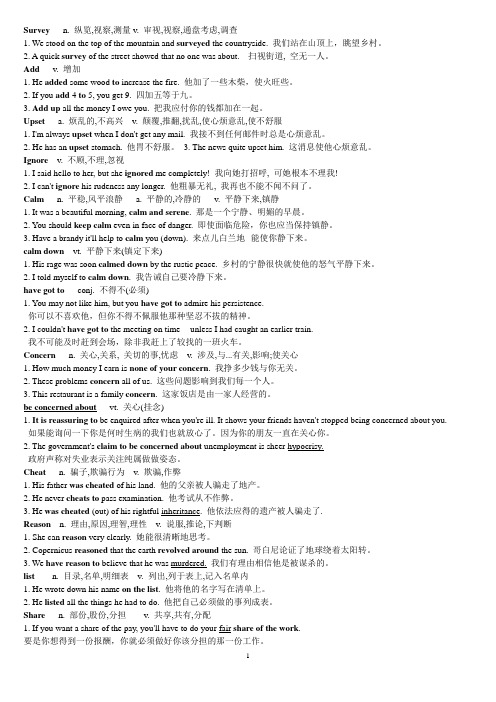
Survey n. 纵览,视察,测量v. 审视,视察,通盘考虑,调查1. We stood on the top of the mountain and surveyed the countryside. 我们站在山顶上,眺望乡村。
2. A quick survey of the street showed that no one was about. 扫视街道, 空无一人。
Add v. 增加1. He added some wood to increase the fire. 他加了一些木柴,使火旺些。
2. If you add 4 to 5, you get 9. 四加五等于九。
3. Add up all the money I owe you. 把我应付你的钱都加在一起。
Upset a. 烦乱的,不高兴v. 颠覆,推翻,扰乱,使心烦意乱,使不舒服1. I'm always upset when I don't get any mail. 我接不到任何邮件时总是心烦意乱。
2. He has an upset stomach. 他胃不舒服。
3. The news quite upset him. 这消息使他心烦意乱。
Ignore v. 不顾,不理,忽视1. I said hello to her, but she ignored me completely! 我向她打招呼, 可她根本不理我!2. I can't ignore his rudeness any longer. 他粗暴无礼, 我再也不能不闻不问了。
Calm n. 平稳,风平浪静 a. 平静的,冷静的v. 平静下来,镇静1. It was a beautiful morning, calm and serene. 那是一个宁静、明媚的早晨。
2. You should keep calm even in face of danger. 即使面临危险,你也应当保持镇静。
人教版高中英语必修一知识点总结

人教版高中英语必修一知识点总结高中英语必修一知识点第一单元1.add vt/vi加;添加;增添add up合计加起来,但在口语中有时用于否定句,表示“莫名其妙,不说明问题”。
add up to 总计共达,所有一切都说明,总而言之。
add sth(to sth)把……加到……里去。
add to 增加,扩建。
add 表示“继续说,补充说”。
区别add和increaseadd意思是“加,增加”,强调添加。
或者表示将数字加起来求和。
increase“增加”,表示在数量,产量,尺寸,程度等方面的增加。
2.cheat v 欺骗;作弊n 骗子;作弊者;骗人的事cheat sb of sth cheat sth out of sb 从某人处欺诈某物cheat on/at/in 作弊,欺诈3.list v 将事物列于表上;编事物的目录n 名单;目录;一览表make a list of 造表,列……表take…off the list 从表上去掉……stand first on the list 居首位,列前茅as listed above 如上所列4.shareshare in 分享,分担,共用share sth with sb 和某人共用/共享某事物share out 分配,分发;得到股息,升股息share(n.)in/of 一分,部分5.trust vi/vt 信任,信赖;依赖trust in 相信,信任,信仰trust to 依靠(运气等),依赖trust that… 希望,想5)suffer vt/vi 遭受,受到,蒙受;受痛苦,受折磨,受惩罚,受损伤suffer from 受……伤害;患……病痛注意:suffer 和suffer from 都不能用于被动语态6)calm vt/vi/adj. 使平静;使镇定。
平静的,镇静的,沉着的。
calm down 平静下来,镇定下来quite指人对外界事物感触的安静。
- 1、下载文档前请自行甄别文档内容的完整性,平台不提供额外的编辑、内容补充、找答案等附加服务。
- 2、"仅部分预览"的文档,不可在线预览部分如存在完整性等问题,可反馈申请退款(可完整预览的文档不适用该条件!)。
- 3、如文档侵犯您的权益,请联系客服反馈,我们会尽快为您处理(人工客服工作时间:9:00-18:30)。
高中英语必修一知识点第一单元1.add vt/vi加;添加;增添add up合计加起来,但在口语中有时用于否定句,表示“莫名其妙,不说明问题”。
add up to 总计共达,所有一切都说明,总而言之。
add sth(to sth)把……加到……里去。
add to 增加,扩建。
add 表示“继续说,补充说”。
区别add和increaseadd意思是“加,增加”,强调添加。
或者表示将数字加起来求和。
increase“增加”,表示在数量,产量,尺寸,程度等方面的增加。
2.cheat v 欺骗;作弊n 骗子;作弊者;骗人的事cheat sb of sth cheat sth out of sb 从某人处欺诈某物cheat on/at/in 作弊,欺诈3.list v 将事物列于表上;编事物的目录n 名单;目录;一览表make a list of 造表,列……表take…off the list 从表上去掉……stand first on the list 居首位,列前茅as listed above 如上所列4.shareshare in 分享,分担,共用share sth with sb 和某人共用/共享某事物share out 分配,分发;得到股息,升股息share(n.)in/of 一分,部分5.trust vi/vt 信任,信赖;依赖trust in 相信,信任,信仰trust to 依靠(运气等),依赖trust that… 希望,想5)suffer vt/vi 遭受,受到,蒙受;受痛苦,受折磨,受惩罚,受损伤suffer from 受……伤害;患……病痛注意:suffer 和suffer from 都不能用于被动语态6)calm vt/vi/adj. 使平静;使镇定。
平静的,镇静的,沉着的。
calm down 平静下来,镇定下来quite指人对外界事物感触的安静。
对人时,侧重不激动,平静温和,不发表意见。
still指完全没有声音或者没有动静,突然静止不动。
silent主要指人不爱说话,沉默不语。
7)concernbe concerned about 担心,关心as/so far as…be concerned 关于,至于,就某人而言have no concern for 毫不关心concern oneself in/with/about sth 忙于,从事;关心,关切have a concern in 和……有厉害关系be concerned in/with 参与,与……有关8)separate v/adj 分开,和……分手;单独的,分开的,不同的separate…from 使……和……分离9)reasonlose one’s reason 失去理智,发狂by reason of 由于bring sb to reason 说服某人理智些within reason 合理without reason 不合理listen to reason 听从道理reason sb into/out of sth 以理说服某人做/不做某事10)powerbeyond /out of one’s power 力所不及的,不能胜任的=not within one’s powerin power 当权的,握有政权的come into power掌权,得势11)habitform / make a habit of doing=make it a habit to do sth 养成做某事的习惯be in the habit of 有……的习惯fall/get into a habit of 沾染(养成)……习惯break(off)a habit=get out a habit 戒除一种习惯form good habits 养成良好的习out of habit 出于习惯12)according to为介词短语,后跟名词,代词,不能很从句,表示“根据;按照;试……而定”。
according to其后引出的信息应来自别人或者别处,不能来自说话者自己。
according to其后不能跟opinion,view等名词。
according as 相当于连词,后跟从句,意为“正像,根据,按照,如果”。
13)join in区别join;join in;take part in;attendjoin 参加某个组织或者团体(党派,军队等)<ps:这些名词前面要加定冠词>,并且成为其中的一员。
join in 参加正在进行着的活动,如游戏,讨论,辩论,谈话等。
take part in 参加会议或者群众性的活动,并且在其中法会一定的作用。
attend 参加会议、仪式、婚礼、葬礼、上课、上学、听报告等。
重在强调“参与”的动作,不强调参加者的作用。
14)dare作实意动词有人称和数的变化,也有时态的变化;作情态动词,用于否定句,疑问句和条件句中,有时态的变化,但是没有人称和数的变化。
①在肯定据中的dare,dares,dared之后,不定式一遍加to。
②在否定句中和疑问句中的dare之后,不定时一般不加to。
③在用do或者does构成的否定句和疑问句中,理论上虽然应该有to,实际使用却经常把to省略。
I dare say…我敢打赌说……15)go through 经历;经受;通过考试;经过;审阅;检查go with 伴随,与……协调go up 上升;建起;上涨go over检查,审查;复习,重温go out 熄灭;公布;播出go ahead 进行,进展;(with)赞同go into从事,参加(某一行业);调查16)get along with 同……相处;进展get away 离开;逃避get back 回来;拿回get down 拿下;写下get in 进入;收获get down to 开始认真做…… get on/off 上/下车get over 克服;战胜get across 被理解get through 完成;通过;接通电话get up 起床get it 明白,理解;猜中17)with复合结构,也可以叫做独立主格结构,在格式上没有谓语动词,在句中常作状语,表示伴随,原因,方式,条件等。
①with+名词+介词短语。
在句中作状语,作后置定语。
②with+名词/代词+过去分词。
其中过去分词表示被动或者完成了的动作。
③with+名词/代词+现在分词。
其中现在分词表示主动或者正在进行的动作。
④with+名词/代词+不定式。
其中不定式表示将要发生的动作。
⑤with+名词/代词+形容词。
18)no longer=not…any longer 表示不再继续或者再现过去某一时刻发生或存在而一直延续的动作/状态时,常用于过去时、现在时或者将来时的句子中。
no more=not…any more 表示再也不重复过去反复发生的动作时,常用于过去时或者将来时的句子中。
When he saw the toy,the baby cried no longer.当看到玩具时,那婴儿不再哭了。
Now she wasn’t afraid any more..现在她再也不害怕了。
19)①settle down to 决心去做……,专心去做…… settle on/upon 决定……,选定……②have trouble with 使伤脑筋,苦恼;跟某人闹别扭ask for trouble 自讨苦吃be in trouble 在困境中,有纠纷get sb into trouble 陷入困境make trouble 惹麻烦put sb to trouble 麻烦某人take the trouble to do 费力做3. 语法直接引语变为间接引语(注意:变化时句子一定为陈述句语序。
)人称的变化①直接引语中主语第一人称或者被第一人称所修饰,人称要与“讲话人”的人称一致。
②直接引语的第二人称,或者被第二人称所修饰,人称要与“听话人”的人称一致。
③直接引语中的第三人称不变化。
“一随主,二随宾,第三人称不更改”。
二、时态的变化直接引语——间接引语一般现在时——一般过去时一般过去时——过去完成时现在进行时——过去进行时现在完成时——过去完成时过去完成时——过去完成时一般将来时——过去将来时时态不变化的情况:①直接引语是客观真理。
②直接引语是过去进行时,时态不变。
③直接引语中有具体的过去某年、某月、某日作状语,变为间接引语时,时态不变。
④直接引语如果是一般现在时。
表示一种反复出现或习惯性的动作,变间接引语,时态不变。
⑤如果直接引语中的情态动词没有过去时的形式(例:ought to,had better, used to)和已经是过去时的形式时,(例:could, should, would, might)不再变。
第二单元1)includeinclude是及物动词,后跟名词,代词或者动名词作宾语,或者跟宾语+介词短语等。
including通常为介词,相当于having(sb/sth)as a part,包括(某人某物)在内,可与过去分词included互换。
2)present作形容词,若表示“在场的,出席的”通常用作标标语或者后置定语;若表示“现在的,现有的”,通常用作前置定语。
作名词,也可以表示“目前,现在”,多与the连用,常用的词组at present“现在,目前”;还可以表示“礼物”含有“捐赠”的意思。
常有的词组有make sb a present of 表示“将某物赠送给某人”。
作动词,表示“赠送,给与”,后跟双宾语;也可表示为“正式介绍,引见某人(尤指向级别、地位较高的人)”。
常见用法present one’s apologies/compliments/respects…表示某人的歉意/赞扬/敬意……present oneself 出席,列席;present itself 出现,呈现。
3)rulerule over sb/sth 统治某人/某物rule sth/sb out 把某人/某物排除在外as a rule 在大多数情况下,通常表示“控制;影响”时多用作被动语态。
作名词时表示“规则,规章,条例;惯常用法;统治;尺”。
4)recognize为非延续性动词,不用于进行时;强调原来认识的东西意为“认出,分辨出”。
表示“承认某人/某物有效或者属实”有时与as连用。
与名词或者名词词组连用,that引导的从句连用,也可表示“认识到,认清某事物”。
5)commend作动词多为及物动词,表示命令,后接名词+不定式。
表示“统率,指挥,控制,掌握”,后常接宾语。
作动词或名词都可以跟从句,从句中用should(常省略)+动词原形。
